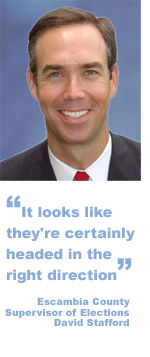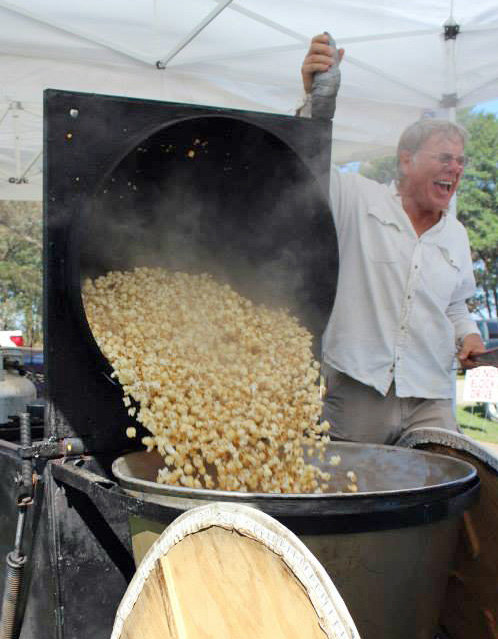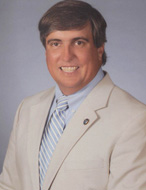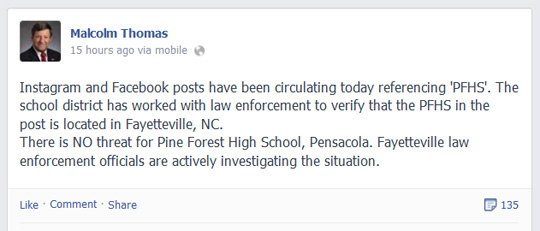State Pursues Voter Purge With Caution; Stafford: Right Direction
October 7, 2013
Saying they learned from last year’s mistakes, Florida’s top elections officials released a revised non-citizen voter purge process to elections supervisors Thursday, even as Democrats accused Gov. Rick Scott of trying to keep minority voters from casting their ballots.
Secretary of State Ken Detzner met with more than a dozen Northwest Florida supervisors of elections in Panama City during the first stop in a five-day “Project Integrity” tour in a preemptive attempt to calm fears about the purge scrapped last year after supervisors discovered the data they received from the state was flawed.
 “It’s going to start very slowly. It’s going to be deliberative,” Detzner said. “We want to make sure that you’re confident that the information we are giving you is the kind of information you demand from the Division of Elections.”
“It’s going to start very slowly. It’s going to be deliberative,” Detzner said. “We want to make sure that you’re confident that the information we are giving you is the kind of information you demand from the Division of Elections.”
Detzner is pinning hopes for a smoother process on the Department of Homeland Security’s Systematic Alien Verification for Entitlements, or SAVE, system, comprised of data from several federal agencies including U.S. Immigration and Customs Enforcement and the U.S. Coast Guard. SAVE does not include information about undocumented immigrants or people who were born in the United States.
Detzner said the cases will be handled on an individual basis in contrast to last year when supervisors were given spreadsheets with the names of voters whose citizenship was in question after matching the state’s central voter database and driver’s license records.
“This is not data dumping back and forth where we send lists to the Department of Highway Safety and Motor Vehicles and we send thousands of lists up to SAVE,” Detzner said. “This is case management. One case at a time managed through SAVE and SAVE is managing them one case at a time. That’s quite a departure from last year. But it requires that type of transparency and attention and detail on each of these cases.”
The complicated process comes after supervisors scrapped last year’s non-citizen purge — the brainchild of Scott — after learning that many of the voters flagged by matching the state’s voter registration database and driver’s license records were naturalized citizens. More than half of the voters on the list were minorities.
The new process will at first be used only on new voter-registration applications, state Division of Elections Director Maria Matthews told the group Thursday. Those applications will again be matched with Department of Highway Safety and Motor Vehicles driver’s license records, which include an “alien registration number” for individuals who are not citizens.
Matthews’s staff will then manually attempt to verify the identity and legal status of flagged voters before vetting them through SAVE, which Matthews said contains “the most current information available about the legal status of a person who is not a U.S. citizen.”
If SAVE does not confirm that they have become citizens, Matthews said her staff will again attempt to verify the individual’s status by cross-checking “secondary sources” — including potentially getting lists of new citizens following naturalization ceremonies from federal officials throughout Florida — and prepare an electronic case file. That file will be sent to supervisors, who will have seven days to inform voters that they have been targeted for removal. Voters will have 30 days to respond before the removal process, and they can request hearings or bring information into the supervisors to prove their citizenship. Supervisors can then check voters’ legal status through SAVE prior to removing them from the list. Voters who have been erroneously removed can be put back on the rolls if they prove their citizenship or can challenge their removal in circuit court.
Detzner said he did not know when the new purge would begin because he still needs to work out agreements with the local supervisors so they can get direct access to SAVE, which costs a minimum of $25 per month and 50 cents for each record check.
Supervisors expressed some concern about potential delays between when someone becomes a citizen and when that information is updated in SAVE. But overall they appeared relieved by what they heard and saw on Thursday.
“It looks like they’re certainly headed in the right direction,” said Escambia County Supervisor of Elections David Stafford. “It sounds like they heard and listened to the input from the supervisors from the last process. We need data. We need information. We need source documentation before we’re going to start noticing these voters again. It sounds like at least they’re beginning to put together a process to do just that.”
But earlier in the day, Florida Democratic Party Chairwoman Allison Tant and Democratic National Committee Chairwoman Debbie Wasserman Schultz blasted Scott, a Republican seeking re-election, for reviving the purge.
Wasserman Schultz accused Scott of using the purge “to scare voters” into thinking the voting rolls are riddled with ineligible voters. Fewer than 200 of the 200,000 voters originally flagged by the state last year made it onto the final list of potentially illegal voters sent to supervisors.
“If your path to victory requires voter purges and suppression, then you are not fit to govern and you certainly don’t deserve a second chance,” Wasserman Schultz, a South Florida congresswoman, told reporters on a conference call.
Wasserman Schultz pointed out that Democratic President Barack Obama won 71 percent of the Hispanic vote and had the support of at least 95 percent of black voters.
“It’s very clear who they’re targeting, why they’re doing this,” she said. “They are going to use every tool at their disposal…Rick Scott and his Republican friends can’t win elections on their merits so they resort to intimidation and voter suppression.”
On Thursday, Detzner repeated what has become a common refrain in the debate about the purge issue — that non-citizens are among other categories of people, including convicted felons who have not had their rights restored and those who have been deemed mentally incompetent by judges — who are banned by law from voting. Elections supervisors are required to remove those ineligible voters from the rolls as part of their regular list maintenance.
“I don’t take my direction from political parties or leaders of particular groups. I listen to people who have positive contributions to make and look for ways to accommodate their needs, but most important is the credibility and reliability of the work that we do. I intend to follow the direction of the Florida Legislature,” he said after the meeting.
Bay County Supervisor of Elections Mark Andersen, a Republican, said the state is experiencing growing pains with the addition of non-citizens to the list-maintenance process, similar to what happened when it began removing felons from the voter database.
“Here’s the simple fact for all the parties. The review should be uniform and apply across the board equally. The simple fact is if you’re not a citizen you’re not supposed to be on our voter registration rolls. The difficult part is how do we get there?” Andersen said.
Andersen acknowledged that the issue is a thorny one, especially with another election on the horizon.
“Florida’s a swing state,” he said. “I know that everybody’s looking and if we find a measurement process with thousands of non-citizens on the rolls it is going to be frustrating for many.”
By Dara Kim, The News Service of Florida
Let The Music Play: Jay And Northview Bands (Photo Gallery)
October 7, 2013
There is plenty going on under the Friday night lights at a high school football. In addition to the gridiron action, there’s also band performances and cheerleaders leading the crowds.
For a gallery form both the Chief sand Royals cheerleaders, click here.
For a game summary and football action photos, click here.
NorthEscambia.com photos, click to enlarge.
Firefighters To Present Program Today At Molino Library
October 7, 2013
Firetrucks and firemen will be at the Molino Branch Library this afternoon at 4:00.
Children of all ages are invited to meet their local firefighters and climb aboard a fire engine. They will also learn about fire safety and what it takes to become a real firefighter. Special treats will be provided by Escambia County Fire Rescue and the Molino Fire Station 18.
For more information, contact the Molino Branch Library at (850) 435-1761.
Officials: Shooting Threat Not Against Pensacola’s Pine Forest High School
October 6, 2013
Authorities say social media posts on Facebook and Instagram making the threat of violence against a Pine Forest High School is not the school in Pensacola but rather one in North Carolina.
 “Instagram and Facebook posts have been circulating today referencing ‘PFHS’. The (Escambia County) school district has worked with law enforcement to verify that the PFHS in the post is located in Fayetteville, NC,” Escambia County School Superintendent Malcolm Thomas said in a Facebook post of his on. “There is NO threat for Pine Forest High School, Pensacola. Fayetteville law enforcement officials are actively investigating the situation.”
“Instagram and Facebook posts have been circulating today referencing ‘PFHS’. The (Escambia County) school district has worked with law enforcement to verify that the PFHS in the post is located in Fayetteville, NC,” Escambia County School Superintendent Malcolm Thomas said in a Facebook post of his on. “There is NO threat for Pine Forest High School, Pensacola. Fayetteville law enforcement officials are actively investigating the situation.”
Thomas told NorthEscambia.com Sunday morning that local law enforcement and school district officials had fully investigated the post since it began circulating on Saturday. An automated call has been place by the district to all Pine Forest parents and guardians alerting them that there was no threat against Pensacola’s Pine Forest High School.
According to the Fayetteville Observer newspaper, the post was originally shared Saturday on the Facebook page of the Fayetteville PFHS. The Cumberland County Sheriff’s Office in Fayetteville investigated, and a 15-year was taken into custody Sunday.
The post reads as if it were written by a boy writing to a girl. The post, later shared by concerned parents and students on the NorthEscambia.com Facebook page, reads in part, “I always loved you…You know me. I love you and I”ll try my best not to shoot you Monday, but I can’t say the same for the rest of the kids. This is not a joke…I am going to shoot up the school.”
“The bottom line is there is no threat against our Pine Forest High School here in Pensacola,” Thomas said Sunday.
Early Morning Wreck Claims Life Of Cantonment Man
October 6, 2013
A Cantonment man died in a single vehicle crash on I-10 in Santa Rosa County early Sunday morning.
 The Florida Highway Patrol said 25-year old Brandon Earl Dubose was pronounced deceased following the 1:15 a.m. accident on I-10 at mile marker 20. He was traveling eastbound when he lost control of his 2010 Volkswagen, left the roadway, struck two pine trees and overturned.
The Florida Highway Patrol said 25-year old Brandon Earl Dubose was pronounced deceased following the 1:15 a.m. accident on I-10 at mile marker 20. He was traveling eastbound when he lost control of his 2010 Volkswagen, left the roadway, struck two pine trees and overturned.
Dubose, who was not wearing a seat belt, was ejected from the vehicle, according to the FHP.
Thousands Flock To Jay Peanut Festival (With Photo Gallery)
October 6, 2013
The skies were sunny Saturday over Brenda Gabbert’s 56-acre farm near Jay, a far cry from the weather Tropical Storm Karen had threatened. The crowds, perhaps just a little bit smaller than most years, still made the trek to the Jay Peanut Festival.
“I describe it to people as being like an old-fashioned county fair, without the carnival rides,” said Gabbert, who has coordinated the festival with her husband, Gene, for 23 years.
 “It’s all about farming and rural life. That’s what we try to show people,” she said. “It’s good for the whole family. There is something for everybody. We really cater to the kids.”
“It’s all about farming and rural life. That’s what we try to show people,” she said. “It’s good for the whole family. There is something for everybody. We really cater to the kids.”
During an ordinary Jay Peanut Festival, with good weather and all, as many as 70,000 people will attend the two day event.
For a photo gallery, click here.
The festival site is a functioning farm, with 40 acres of peanuts – which is managed by a farmer who leases it from the Gabberts – and 16 acres that includes the couple’s home and a field of hay.
Their property also includes two museums – a farming museum and replica of a 1940s style John Deere dealership – as well as a fleet of restored classic tractors. All of that is incorporated into the festival.
“My husband has all of these tractors he’s restored himself,” Gabbert said. “We let other people bring their stuff if they want to show it.”
Of course, the highlight of the Peanut Festival is the versatile legume itself. The peanut plays a vital role in Santa Rosa County agriculture. In 2011, the most recent year for which statistics are available, peanuts were the most valuable crop in the county, accounting for $22 million in gross value.
 At the festival, the Jay Volunteer Fire Department has exclusive domain over the sale of boiled peanuts. The department uses the money raised to help supplement its modest public funding. Other vendors will offer green peanuts – the kind patrons take home to boil for themselves – roasted peanuts, fried peanuts, peanut brittle, baked goods with peanuts and many of the other forms the protein-packed snack can take.
At the festival, the Jay Volunteer Fire Department has exclusive domain over the sale of boiled peanuts. The department uses the money raised to help supplement its modest public funding. Other vendors will offer green peanuts – the kind patrons take home to boil for themselves – roasted peanuts, fried peanuts, peanut brittle, baked goods with peanuts and many of the other forms the protein-packed snack can take.
In all, Gabbert had, before Tropical Storm Karen’s idle threats, expected as many as 250 vendors, including crafters, businesses, churches and other non-profit organizations.
“We gain more vendors every year and more people,” she said. “It’s getting crowded.”
 Both days of the festival featred live entertainment with Christian music on Sunday that followed a church service.
Both days of the festival featred live entertainment with Christian music on Sunday that followed a church service.
The festival offered pony and horse rides, stage coach rides, hay rides, a rock climbing wall, a bungee jump, a mechanical bull, train rides and inflatable attractions.
Admission and parking at the festival were free, a point of pride for Gabbert. The festival is funded solely through vendor fees.
“We get letters from people who tell us this is the only thing they can afford to come to,” she said. “They have kids and they don’t have the money to go to things that have admission. They can come here and not spend a penny if they don’t want to.”
The Jay Peanut Festival dates to 1990 when the Gabberts started the event in memory of their daughter, Melissa, a 19-year-old who died earlier that year from cancer.
The Gabberts’ other child, Mandy Gabbert Simmons, helps with the festival. Her husband, Tony Simmons, helps get ready for the festival. However, since Simmons is the Jay fire chief, he is busy with the boiled peanuts while the festival is underway.
For a photo gallery, click here.
Pictured top: Crowds stroll through craft booths Saturday under sunny skies at the annual Jay Peanut Festival. Pictured top inset: One of the Gabbert farm museums. Pictured middle inset: The Jay Volunteer Fire Department is the sole vendor with boiled peanuts; it’s the department’s big fundraiser. Pictured bottom inset: Freshly cooked kettle corn. Pictured below: Numerous restored tractors and farm implements are on display. NorthEscambia.com photos by Michelle Gibbs, click to enlarge.
Justices Backs Off From Panhandle Drug Sniffing Dog Case
October 6, 2013
After being reversed by the U.S. Supreme Court, the Florida Supreme Court on Thursday backed away from a decision that would have suppressed evidence because of questions about the reliability of a drug-sniffing dog.
 The case involved a traffic stop of Clayton Harris in Blountstown.
The case involved a traffic stop of Clayton Harris in Blountstown.
Aldo, the drug-sniffing dog, alerted on Harris’ door handle, and a police officer said that alert was the primary reason he had probable cause to search the vehicle. The officer found ingredients to cook methamphetamine, which Harris later admitted making at his house.
The Florida Supreme Court initially ruled the evidence should be suppressed and held that “the fact that a drug-detection dog has been trained and certified to detect narcotics, standing alone, is not sufficient to demonstrate the reliability of the dog.”
But the U.S. Supreme Court in February unanimously overturned that ruling, finding the Florida justices had applied guidelines that were too strict in determining the reliability of drug-sniffing dogs.
Florida justices went along Thursday, and Harris’ case was tossed back to a lower court.
by The News Service of Florida
Robinson Files For Third Term On Escambia Commission
October 6, 2013
Incumbent Grover Robinson has pre-filed to run in 2014 for his third term as the District 4 representative on the Escambia County Commission.
 Robinson, in a press release, said:
Robinson, in a press release, said:
“I file again to start the election process. It has been a pleasure to serve the citizens of District 4. We have accomplished much since 2006 including reducing county taxes, improving county infrastructure, fighting for restoration from the Deepwater Horizon Oil Spill and building a better economic future for the county and its citizens.
“However, I am most excited that another term will allow me to not only continue these actions but also to serve in a statewide capacity as the President of the Florida Association of Counties. This office will provide me an opportunity to position Escambia County as a leadership community in Tallahassee and Washington DC.
“I look forward to serving the citizens of District 4 and Escambia County and I hope they will allow me the opportunity to serve them in these capacities.”
Jim Allen Students Learn About Fire Safety
October 6, 2013
Students at Jim Allen Elementary School learned all about fire safety last week.
Pictured: The Engine 4 “B Shift” from the Cantonment Station of Escambia Fire Rescue with a Jim Allen pre-school class. Courtesy photo for NorthEscambia.com, click to enlarge.
Florida Gov’t Weekly Roundup: Game On For Gambling, Water War
October 6, 2013
There was no shutdown in state government this week, even as federal agencies closed their doors because of a budget squabble between congressional Republicans and President Barack Obama.
In fact, most state agencies were expected to weather the ripple effects of the shutdown with relatively little trouble, as long as it doesn’t drag on too much longer. “We are working closely with our agencies to monitor any potential state impact,” a spokeswoman for Gov. Rick Scott wrote in an email.
 But it was quiet enough in Tallahassee and other corners of state government that it could almost be mistaken for a shutdown. New laws took effect with relatively little fuss, and preparations were made for a second week of committee meetings ahead of the 2014 legislative session.
But it was quiet enough in Tallahassee and other corners of state government that it could almost be mistaken for a shutdown. New laws took effect with relatively little fuss, and preparations were made for a second week of committee meetings ahead of the 2014 legislative session.
A gambling study was being edited to ends that are unclear. And there were so many battles over fresh water that it was easy to mistake the political scene for a post-apocalyptic Kevin Costner movie. Karen churned off the coast, a reminder that hurricane season is still in full swing.
For the time being, though, the troubles affecting Washington, D.C., remained far removed from Florida.
ROUND AND ROUND IT GOES
The opening bid on expanded gambling in Florida didn’t initially seem as if it would go well for those who want to open resort casinos in Florida or those who just want more opportunity to play blackjack. A draft of an analysis by The Spectrum Gaming Group, obtained by the News Service of Florida, suggested that making a play at Las Vegas’ status as the nation’s premier gambling destination wouldn’t boost the economy much.
“Overall, Spectrum believes that the expansion of casino gambling, whether on a small scale or very large scale, would have, at best, a moderately positive impact on the state economy,” according to the draft report.
Lawmakers plan to rely heavily on the economic analysis by Spectrum to craft the state’s gambling landscape during the 2014 legislative session.
But at least some lawmakers seemed to be seeking a different deal. They insisted they weren’t trying to rig the game, just trying to get a firmer set of numbers. But on Tuesday, Spectrum executives asked for another 30 days to complete the study conducted with its partner Regional Economic Models Inc., or REMI. Senate President Don Gaetz, R-Niceville, said the Legislature asked for the revision because of questions raised by the Legislature’s economist, Amy Baker.
“We must respectfully request an extension of the deadline in order to fully review the results of the REMI model, which require more detailed examination to ensure their accuracy, and that those results are presented in a manner that is clear and understandable to all readers,” Spectrum Managing Director Michael Pollock wrote Tuesday in a letter to Gaetz and House Speaker Will Weatherford, R-Wesley Chapel.
A month ago, legislative staff asked Spectrum to revise a previous draft of the report because of concerns about assumptions built into the REMI analysis.
The analysis was based in part on an assumption that a compact with the Seminole Indian Tribe, set to expire in 2015 unless reauthorized by the governor and the Legislature, would be renewed. The part of the deal at issue gives the Seminoles the exclusive rights to operate card games like blackjack and baccarat at tribal casinos in exchange for about $233 million in annual payments to the state.
After this week’s move to rework the numbers again, Gaetz insisted that the report was not rejected because of its content.
“The Legislature has not and will not request that any outcomes be changed,” he wrote.
But on Friday, Senate Gaming Committee Chairman Garrett Richter, R-Naples, issued a memo to the committee members accompanied by a highly-marked up version of the report identifying areas “needing clarification and explanation.” Spectrum analysts will appear at a committee meeting Monday.
Numerous tables — along with conclusions — based on the REMI model are highlighted, including one which said the state would lose $22 million a year under “the most robust” gambling scenario of 33 casinos and six destination resorts throughout the state.
“Please disregard economic and fiscal impact calculations and findings in this section,” reads a note by committee staff director John Guthrie attached to many of the melon-colored problematic portions in the report.
FLORIDA ROLLS DICE IN WATER WAR
Meanwhile, the water wars continued with a new salvo against Georgia, as Florida filed a lawsuit Tuesday in the U.S. Supreme Court as part of a long-running battle with the Peach State over river withdrawals that Florida says have damaged Apalachicola Bay.
The only question seems to be whether it’s too late to help the Franklin County seafood workers who were already struggling to survive.
Scott and Attorney General Pam Bondi followed through on an August announcement that Florida would seek injunctive relief so more water would flow to the bay, which collapsed last year in the face of a historic drought and dwindling releases of freshwater from Georgia.
The lawsuit is the latest skirmish in a 23-year dispute among Florida, Georgia and Alabama about the water in the Apalachicola-Chattahoochee-Flint River Basin.
According to the lawsuit filed Tuesday, Georgia is using more than 360 million gallons of water daily and expects that figure to nearly double to 705 million gallons daily by 2040.
“Peak withdrawals, associated with watering lawns, car washing, golf courses, and parks, come when inflow needs are most critical to Florida — the dry summer months,” the lawsuit said. “Conservation efforts in Georgia have been minimal, even though it is the most cost-effective and readily available way to meet Georgia’s growing demands.”
But a spokesman for Georgia Gov. Nathan Deal said the state would defend its water rights.
“The only ‘unmitigated consumption’ going on around here is Florida’s waste of our tax dollars on a frivolous lawsuit,” said Deal’s communications director, Brian Robinson.
The bay’s historical productivity has come from its mix of saltwater and freshwater, but without enough freshwater coming from Georgia, the mixture is too salty for oysters and other seafood to thrive. Historically, the bay produced 90 percent of Florida’s oysters and 10 percent of the nation’s supply, but no more.
“The oyster houses aren’t able to fill their orders,” said Dan Tonsmeire, executive director of Apalachicola Riverkeeper. “The people ordering the oysters go somewhere else, so they lose their market.”
There have been a variety of skirmishes about the water over the decades, but Scott’s office said this lawsuit differs from others because “those cases addressed the management of the interstate waters by the U.S. Army Corps of Engineers, not depletions by the states. This case goes directly to the source of the harms suffered by Florida and Apalachicola Bay — upstream consumption and storage of water by Georgia.”
But while there was a lack of freshwater in Northwest Florida, there was a surplus of it in some parts of South Florida. So state Sen. Joe Negron, R-Stuart, asked Congress on Thursday to give control of Lake Okeechobee to Florida in an effort to cut back on harmful water releases into estuaries on both sides of the lake.
“The Army Corps of Engineers has been running this project for decades, they have failed, and they need to be replaced with those of us in Florida that we can vote for or against and people that have our best interest at heart,” Negron said.
Negron asked Congress to wrest control of the of the lake from the Army Corps of Engineers as members of Congress repeatedly expressed bipartisan support for longstanding efforts to clean waterways east and west of the lake and to secure funding so more water can be directed to the south.
The Army Corps, which didn’t have representatives at the meeting due to the federal government shutdown, tries to maintain the water level of the lake between 12.5 feet and 15.5 feet to lessen stress on the dike, which is basically a 30-foot-high earthen structure that surrounds the lake.
HIGH-STAKES PURGE STARTS AGAIN
Secretary of State Ken Detzner traveled Thursday to Panama City to pitch a renewed non-citizen voter purge process to skeptical elections supervisors.
A similar effort last year led to months of political controversy and legal fights. It all began when the state sent the names of nearly 200,000 potentially ineligible voters to elections supervisors, telling them that the people on the list may not be U.S. citizens and, if they weren’t, to scrub them from the voting rolls.
Detzner and Gov. Rick Scott said they were trying to make sure ineligible people didn’t vote, but Democrats accused them of trying to suppress the minority vote — and using a slipshod system to do it. Criticisms from the left escalated after analysis of the names showed that more than half of the flagged voters were minorities, who helped boost President Obama to victory in 2008 and in 2012.
Detzner admitted the state mishandled last year’s purge but made clear to more than a dozen Northwest Florida elections supervisors on Thursday that state elections officials have a new process of identifying potentially ineligible voters that shows they learned from last year’s mistakes. To underscore that message, the Department of State has dubbed the effort “Project Integrity.”
“It’s going to start very slowly. It’s going to be deliberative,” Detzner said. “We want to make sure that you’re confident that the information we are giving you is the kind of information you demand from the Division of Elections.”
The state will start checking eligibility only of new voter applicants, and will again match voting applications with driver’s license records that include information about legal status and an “alien registration number” for non-U.S. citizens, who are allowed to drive.
If the voter shows up as a potential non-citizen, the state will then use the U.S. Department of Homeland Security’s Systematic Alien Verification for Entitlements, or SAVE, database, to check out his or her legal status. The records will then be manually checked by someone in the state Division of Elections before being sent to local supervisors, who are the only ones authorized to remove a voter from the rolls.
“This is not data dumping back and forth where we send lists to the Department of Highway Safety and Motor Vehicles and we send thousands of lists up to SAVE,” Detzner assured the supervisors.
But Democrats accused Scott, who is seeking re-election, of another election-year ploy aimed at reducing the number of minority voters.
“It’s an attempt to suppress voting because you can’t win an election fair and square without doing it,” Florida Democratic Party Chairwoman Allison Tant told reporters on a conference call Thursday.
Democratic National Committee Chairwoman Debbie Wasserman Schultz accused Scott of trying to scare voters into believing that the voting rolls are riddled with non-citizens. Fewer than 200 of the nearly 200,000 voters flagged as potentially ineligible turned out to be non-U.S. citizens last year.
“If your path to victory requires voter purges and suppression then you are not fit to govern and you certainly don’t deserve a second chance,” Wasserman Schultz said.
Detzner has insisted all along that he’s just doing his job, which requires him to make sure the central voter database is clean of ineligible voters, including felons, deceased persons, people who’ve been deemed mentally incompetent by judges and non-citizens.
STORY OF THE WEEK: A draft of a $400,000 study indicates that expanded gambling in Florida would have a relatively minimal impact on the economy. But the final version will be reworked, with Senate Gaming Committee Chairman Garrett Richter, R-Naples, saying the report was too confusing and needed to be reviewed for accuracy.
QUOTE OF THE WEEK: “I don’t take my direction from political parties or leaders of particular groups. I listen to people who have positive contributions to make and look for ways to accommodate their needs, but most important is the credibility and reliability of the work that we do. I intend to follow the direction of the Florida Legislature,” Secretary of State Ken Detzner, after meeting with elections supervisors to pitch a renewed purge of non-citizens from voting rolls.
by Brandon Larrabee and Dara Kim, The News Service of Florida









